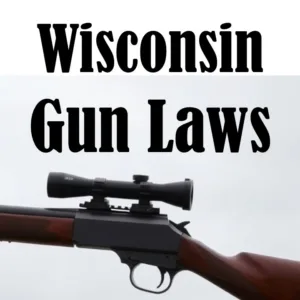Wisconsin has a mix of permissive and regulated gun laws, allowing both open and concealed carry under specific conditions. This guide provides an overview of firearm regulations in Wisconsin, covering purchasing requirements, carry laws, restricted locations, and self-defense rights.
Wisconsin Gun Laws Overview

Purchasing Firearms in Wisconsin
Wisconsin has straightforward requirements for purchasing firearms, including background checks and minimum age requirements.
Key Requirements:
- Permit to Purchase: Not required for any type of firearm.
- Background Check: Required for all firearm purchases from federally licensed dealers, but not mandated for private sales.
- Waiting Period: There is no mandatory waiting period in Wisconsin.
- Minimum Age: Buyers must be at least 21 years old to purchase a handgun and 18 for rifles and shotguns.
Firearm Licensing in Wisconsin
Wisconsin does not require a general firearm license to own or carry guns. However, individuals must obtain a permit for concealed carry of firearms.
Private Sales and Background Checks
Wisconsin does not require background checks for private gun sales, including transactions at gun shows. However, federal laws still prohibit the sale of firearms to individuals who are disqualified from firearm ownership.
Open Carry in Wisconsin
Open carry is legal in Wisconsin for individuals 18 and older. However, some areas restrict where firearms can be openly carried.
Key Points on Open Carry:
- Permitless Open Carry: Allowed without a permit for adults 18 and over.
- Vehicle Carry: Firearms must be unloaded if openly carried in a vehicle without a permit.
Concealed Carry in Wisconsin
Wisconsin requires a Concealed Weapon License (CWL) for individuals who wish to carry concealed firearms.
Concealed Weapon License (CWL):
- Eligibility Requirements: Applicants must be at least 21, pass a background check, and complete a firearm safety course.
- Application Process: Applications are submitted through the Wisconsin Department of Justice, with fees, identification, and training documentation.
- Permit Validity: CWLs are valid for five years.
Reciprocity with Other States
Wisconsin honors concealed carry permits from several states. Additionally, residents with a Wisconsin CWL can carry concealed in states that recognize Wisconsin’s permit. It is advisable to verify the laws of the destination state when traveling.
Restricted Locations for Carrying Firearms in Wisconsin
Certain places in Wisconsin restrict firearm carry, even for individuals with a CWL.
- Schools and Educational Facilities: Firearms are prohibited on school grounds, including K-12 and certain college campuses, unless specific exceptions apply.
- Government Buildings: Firearms are restricted in courthouses, police stations, and some state government buildings.
- Private Property: Private property owners may prohibit firearms on their premises, and individuals must respect posted signage.
- Bars and Restaurants: Firearms are prohibited in bars or any establishment deriving more than 50% of revenue from alcohol sales, even with a CWL.
- Public Transit: Certain public transit facilities restrict firearms, especially in larger cities.
Assault Weapons and Magazine Capacity in Wisconsin
Wisconsin does not impose restrictions on assault weapons or magazine capacities. Residents may legally own firearms and accessories that are federally compliant.
Self-Defense Laws in Wisconsin: Castle Doctrine and Stand Your Ground
Wisconsin follows Castle Doctrine principles, allowing individuals to defend themselves with force, including deadly force, within their homes. Wisconsin also recognizes Stand Your Ground in certain self-defense scenarios.
Castle Doctrine
Under the Castle Doctrine, individuals are not required to retreat when defending themselves in their homes, vehicles, or places of business if they believe they face imminent harm.
Stand Your Ground
Wisconsin generally supports Stand Your Ground principles outside the home, allowing individuals to defend themselves with reasonable force when they have a right to be present.
Firearms Prohibited Persons in Wisconsin
Certain individuals are prohibited from owning or possessing firearms in Wisconsin under both state and federal law.
- Felony Convictions: Convicted felons are prohibited from firearm ownership.
- Domestic Violence Convictions: Those with certain domestic violence convictions or active restraining orders cannot possess firearms.
- Mental Health Restrictions: Individuals who have been involuntarily committed or found mentally unfit by a court may face restrictions.
- Drug and Substance Abuse: Those with recent drug-related convictions may be prohibited from possessing firearms.
Penalties for Violating Gun Laws in Wisconsin
Violating Wisconsin’s gun laws can result in criminal penalties, including fines, imprisonment, and potential loss of firearm rights.
- Unlawful Possession: Possessing a firearm as a prohibited person or carrying in restricted areas can lead to misdemeanor or felony charges.
- Illegal Carry: Carrying a concealed weapon without a CWL, or carrying in restricted locations, can result in penalties.
- Brandishing or Reckless Use: Displaying or using a firearm in a threatening or reckless manner can lead to criminal charges.
Conclusion: Understanding Wisconsin’s Gun Laws
Wisconsin’s gun laws allow for both open and concealed carry under specific conditions. Residents and visitors should familiarize themselves with restricted locations and self-defense laws to ensure they remain compliant with state regulations.
FAQs About Gun Laws in Wisconsin
1. Do I need a permit to buy a gun in Wisconsin?
No, Wisconsin does not require a permit to purchase firearms.
2. Is open carry allowed in Wisconsin?
Yes, open carry is permitted for individuals 18 and older without a permit.
3. Does Wisconsin restrict magazine capacity?
No, Wisconsin does not impose magazine capacity restrictions.
4. Does Wisconsin honor out-of-state concealed carry permits?
Yes, Wisconsin recognizes concealed carry permits from several other states.
5. What self-defense laws apply in Wisconsin?
Wisconsin follows the Castle Doctrine and Stand Your Ground principles, allowing for self-defense without a duty to retreat in specific scenarios.
